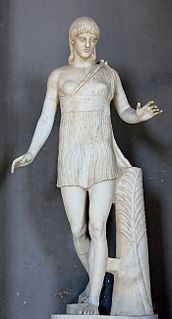 W
WLucius Livius Andronicus was a Greco-Roman dramatist and epic poet of the Old Latin period. He began as an educator in the service of a noble family at Rome by translating Greek works into Latin, including Homer's Odyssey. They were meant at first as educational devices in the school he founded. He wrote works for the stage—both tragedies and comedies—which are regarded as the first dramatic works written in the Latin language of ancient Rome. His comedies were based on Greek New Comedy and featured characters in Greek costume. Thus, the Romans referred to this new genre by the term comoedia palliata. The Roman biographer Suetonius later coined the term "half-Greek" of Livius and Ennius. The genre was imitated by the next dramatists to follow in Andronicus' footsteps and on that account he is regarded as the father of Roman drama and of Latin literature in general; that is, he was the first man of letters to write in Latin. Varro, Cicero, and Horace, all men of letters during the subsequent Classical Latin period, considered Livius Andronicus to have been the originator of Latin literature. He is the earliest Roman poet whose name is known.
 W
WPriscus Attalus was twice Roman usurper, against Emperor Honorius, with Visigothic support. He was the last non-Christian Roman emperor.
 W
WCarneades was an Academic Skeptic born in Cyrene. By the year 159 BC, he had started to refute all previous dogmatic doctrines, especially Stoicism and even the Epicureans whom previous skeptics had spared. As scholarch (leader) of the Academy, he was one of three philosophers sent to Rome in 155 BC where his lectures on the uncertainty of justice caused consternation among leading politicians. He left no writings. Many of his opinions are known only via his successor Clitomachus. He seems to have doubted the ability not just of the senses but of reason too in acquiring truth. His skepticism was, however, moderated by the belief that we can, nevertheless, ascertain probabilities of truth, to enable us to live and act correctly.
 W
WDio Chrysostom, Dion of Prusa or Dio Cocceianus, was a Greek orator, writer, philosopher and historian of the Roman Empire in the 1st century AD. Eighty of his Discourses are extant, as well as a few Letters and a funny mock essay "In Praise of Hair", as well as a few other fragments. His surname Chrysostom comes from the Greek chrysostomos (χρυσόστομος), which literally means "golden-mouthed".
 W
WDionysius of Halicarnassus was a Greek historian and teacher of rhetoric, who flourished during the reign of Augustus Caesar. His literary style was Atticistic—imitating Classical Attic Greek in its prime.
 W
WPasiteles was a Neo-Attic school sculptor from Ancient Rome at the time of Julius Caesar. Pasiteles is said by Pliny to have been a native of Magna Graecia, and to have been granted Roman citizenship. He worked during a period where there was a demand for copies of, or variations on, noted works of Greek sculpture; the demand was met by the workshops of Pasiteles and his pupils Stephanus and Menelaus and others, several of whose statues are extant. According to Pliny, Pasiteles made an ivory statue of Jupiter for the temple of Metellus and made statues for the temple of Juno in the portico of Octavia.
 W
WTheophanes of Mytilene was an intellectual and historian from the town of Mytilene on the island of Lesbos who lived in the middle of the 1st century BC. He was a friend of Pompey and wrote an adulatory history of the latter's expedition to Asia. According to Plutarch Pompey granted privileges to Mytilene for Theophanes' sake. The people of Mytilene commemorated him as a hero after his death.